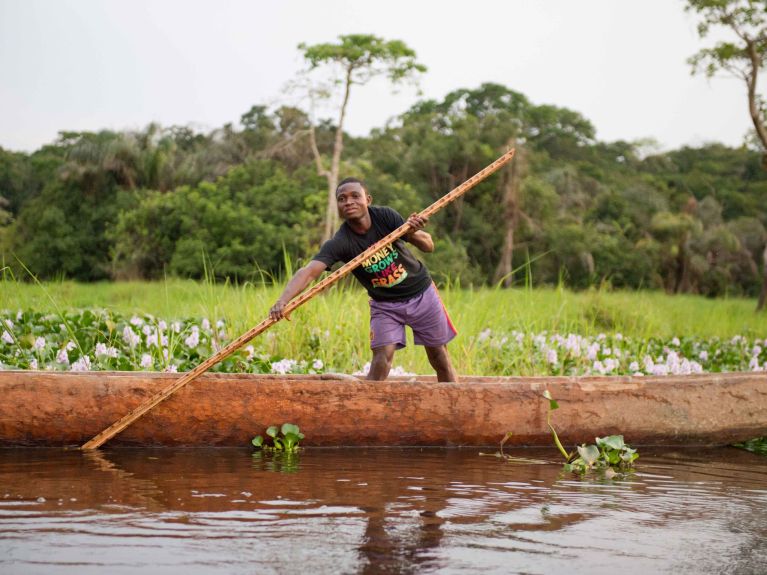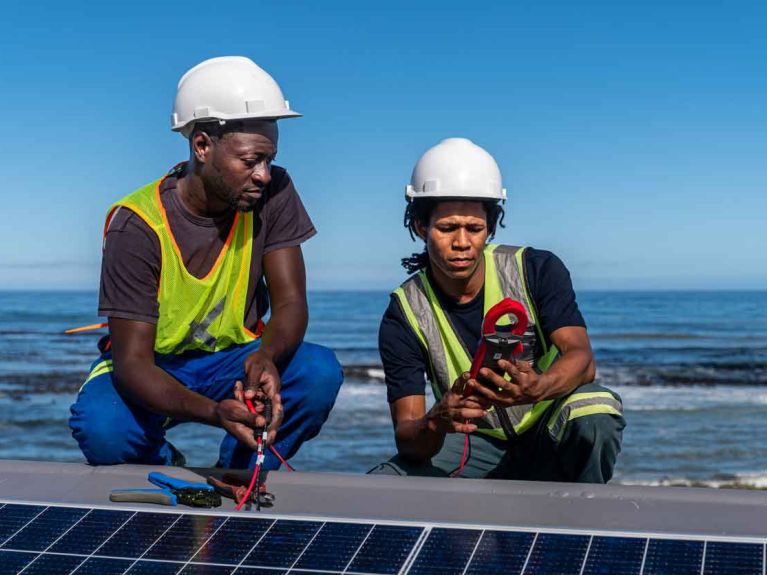Reliable partner for climate action
2025 Africa Climate Summit: Germany is investing in climate projects and strengthening Africa’s voice at COP30.

Taking place in Addis Ababa from 8 to 10 September 2025, the Africa Climate Summit is an important milestone on the road to the next UN International Climate Conference COP30 in Brazil. Germany is being represented by Bärbel Kofler, parliamentary state secretary at the Development Ministry (BMZ), and by Jochen Flasbarth, state secretary at the Federal Ministry for the Environment, Climate Action, Nature Conservation and Nuclear Safety. Read our Q&A to discover which role Germany plays in climate projects on the African continent and beyond.
What are the goals of the 2025 Africa Climate Summit?
At the Africa Climate Summit, the participating African states are hoping to reach a common stance on climate change and identify concrete solutions and adaptation strategies. One central outcome is to be the African Leaders Addis Ababa Declaration, intended to lay down a common African position for the UN Climate Change Conference COP30 in the Brazilian city of Belém in November 2025 and position Africa as a key player in fighting climate change.
Why is the Africa Climate Summit seen as an important milestone ahead of the next UN International Climate Conference COP30 in Brazil?
According to Jochen Flasbarth, the summit is an important step on the path to the UN’s COP30 climate conference: “Two years ago, the first Africa Climate Summit lent important impetus to quicker expansion of renewable energy generation, thus helping to pave the way for the adoption of the historic global energy goals in Abu Dhabi,” said Flasbarth. He went on to say that it was now vital to realise these goals worldwide and in Africa, reduce the dependency on imported fossil fuels and seize the social and economic opportunities that this entails.
Which role does Germany play with respect to climate projects in Africa?
Germany is a reliable partner for Africa, one of the largest donors to climate projects on the continent and makes an important contribution to international climate and environmental funding. In 2023, Germany’s Federal Government pledged nearly 1.5 billion euros in bilateral climate funding from its budget. The focus is on:
- energy
- agriculture
- biodiversity
- environmental protection
- water
Germany also supports efforts to create a conducive environment for mobilising private and public funding for climate change mitigation and adaptation, advocates for levies on carbon-intensive sectors and the reduction of subsidies that are harmful to the climate, and is committed to conserving African forests, especially the Congo Basin forest, which is a vitalcarbon sink.
Why is it worth investing in climate action?
Climate change is having negative impacts on the health and security of people worldwide. “Investing in climate change mitigation and adaptation means investing in a safe future for us all,” said Bärbel Kofler. She added that the African continent was providing impressive evidence of how innovative investment can protect the climate and simultaneously create economic growth and new jobs. “A lot of progress has been made since the first Africa Climate Summit two years ago. More and more African countries are opting for renewable energy,” continued Kofler. She explained that Germany was assisting them as a reliable partner, providing support to a socially just transition, for example through climate partnerships. “Through these efforts, the German government is contributing its fair share to international climate and environmental finance and sending a strong signal for international climate policy,” Kofler said.

Why is the summit also important for Germany and Europe?
The climate crisis in Africa is having a massive impact on international migration, food security and European energy markets. According to the OECD and UNDP, ambitious climate and development goals could enable some sub-Saharan countries to avoid climate damages amounting to over 15 percent of GDP by the end of this century, and could lift more than 45 million people out of extreme poverty by 2035.
What concrete steps is Germany taking to support the expansion of renewable energies in Africa?
At the Africa Climate Summit, the BMZ and the EU will jointly present a regional project to support the African Union in creating an African single electricity market and establishing a coordinated energy policy. Energy is one of the core areas of Germany’s bilateral cooperation programmes in 16 African partner countries. Often, activities in that sector focus on expanding renewable energy generation. One example is Côte d’Ivoire, which put its first solar power plant into operation in 2024 with support from Germany. The plant provides electricity for 150,000 people, saving 35,000 tonnes of greenhouse gas emissions every year. Germany also cooperates closely with South Africa on realising a just energy transition. Germany is supporting the development of green sectors, funding local energy sector companies and training workers for climate-friendly jobs.
Which climate adaptation measures is Germany funding in Africa?
Germany is supporting African cities, for instance by assisting them with climate risk assessments for urban planning in an attempt to make metropolitan areas more resilient to droughts, floods and infrastructural disruptions. In Mozambique, Zambia and Zimbabwe, Germany supports community-based adaptation (CBA) programmes in more than 100 communities. This is an approach by which local communities identify their own risks and needs and then, with local knowledge, joint planning and external support, implement tailormade solutions to improve their resilience.


